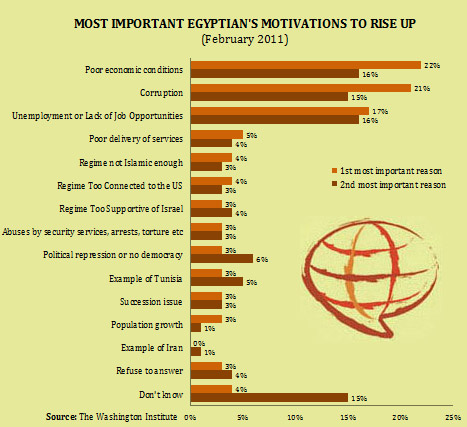
 This is not an Islamic revolt: social and economic factors motivated the revolts in Egypt
This is not an Islamic revolt: social and economic factors motivated the revolts in Egypt
Much has been said about the nature of the riots that had toke place in the Arab world in recent months. When the revolts started in Egypt, many voices compared the Egyptian Revolution with the Islamic Revolution in Iran in 1979.
We saw a crowded Tahrir Square demanding change, and with J. Ahmed and M. Hermes first-hand testimony, we could take a look at the atmosphere just after Mubarak’s fall. Now, with the results of a poll conducted by the Washington Institute, we have a clearer picture of the popular uprisings in Egypt. This poll aims to reveal the main reasons motivating the uprisings in Egypt. This poll aims to reveal the main reasons motivating the uprisings according to the Egyptians. We will also take a glance at the current situation.
If we take social and economic demands from the Egyptian people as the first reason explaining why the Egyptian people rose up, we could see that they sum up more than 50%. Only 7% of Egyptian thought the first or the second reason because the people uprising thought the regime was not Islamic enough. Islamist demands were not an important cause of the revolts in Egypt. The Arab countries experienced a baby boom in the midst-80s. This generation grew up enjoying good levels of education, but with their university degrees finished, they found themselves without job opportunities suitable to their training. These generations and their parents are asking for better living conditions, job opportunities for them and their children, freedom, democracy and respect. As a consequence of the unresolved demands, they were further developed into political demands.
Other data in the Washington Institute’s publication:
– ElBaradei, identified as one of the strongest candidates for September’s elections and one of the leading promoters of anti-government demonstrations, has very little popular support in a presidential straw vote (4%). Support for Amr Musa , leader of the Arab League, was higher (29%). Egyptian President Hosni Mubarak and Prime Minister Omar Suleiman get 18% each.
– The Muslim Brotherhood was only “approved” by 15% and its leaders got barely 1% in a presidential straw vote.
– National priorities: just 12% choose shariah over national power, democracy, or economic development.
– Despite the fears of the ending of the peace treaty with Israel if the regime of Mubarak failed, a higher percentage of the population supports this peace treaty (37%), than opposes it (22%).
– Only 18% approve of either Hamas or Iran.
– A mere 5% say the uprising occurred because the regime is “too pro-Israel”.
– A narrow plurality (36% vs. 29%) say Egypt should have good relations with the USA and 8% say the uprising was unleashed because the regime was “too pro-American regime”. About a half of those polled disapprove of the handing of this crisis by the USA and say they do not trust the USA at all.
Current situation
The Supreme Council of the Armed Forces took power from President Mubarak after he had been forced to resign on 11th February. Mubarak and his family are now under house arrest in Egypt and face several charges of corruption.
After the referendum of 19th March which passed by 77%, parliamentary elections have been announced for next September. Following the referendum, the lifting of emergency law (in force since 1981) and the removal of the restrictions on the formation of political parties to facilitate the political process have also been approved. This means that the new parties have only effective five months to form, chose their leaders, make their political ideology public with an effective electoral programme and prepare their campaigns. The Muslim Brotherhood and the dismembered Mubarak’s National Democratic Party, already formed, will benefit from this[i].
This is a nonprofit explanation
[i] “Mubarak y su familia, bajo arresto domiciliario en Egipto”, El País, 03/29/2011.
¿Quieres recibir más explicaciones como esta por email?
